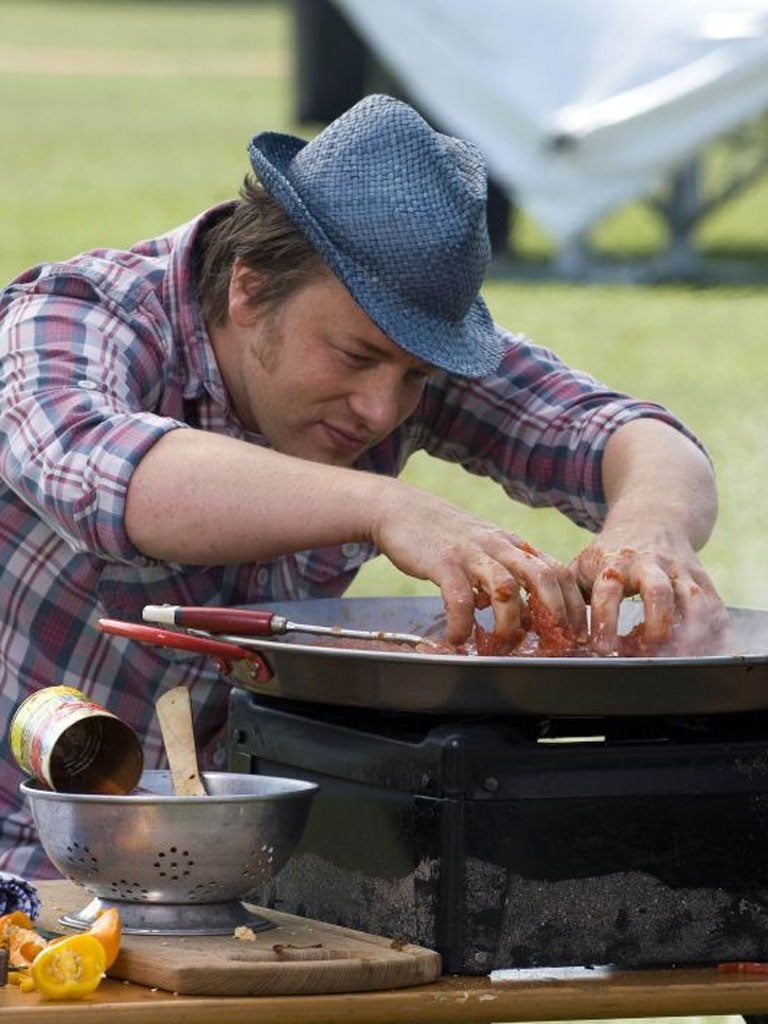
Essex's answer to Escoffier returns home for his 14th book. Jamie's Great Britain (Michael Joseph, £30) is probably Mr Oliver's best. Mercifully less laddish in tone, it features finessed versions of local favourites from curried roast chicken to a haggis-based shepherd's pie. Oliver's "humble pea and ham soup" (more of a stew) looks equally tempting, but why use butter rather than beef suet in the dumplings?
Though the alphabetical ordering of Lucas Hollweg's Good Things to Eat (Collins, £20) produces an odd banquet – it starts with puds ("Berries and Cherries") and ends with "Winter Soup" – I could happily eat for years from his ungussied recipes. Pork belly with juniper and apples sounds obvious - but roasting whole eating apples with this most succulent joint is miles better than the traditional Bramley slurry. Some of Hollweg's recipes are no more than roast tomatoes with mozzarella or lemon curd on toast. Excellent.
Giorgio Locatelli's Made in Sicily (Fourth Estate, £30) is not so much a coda to his monumental Made in Italy as a rich and distinctive sequel, like the island itself. In his intelligent, evocative introductions, Locatelli unfolds a cuisine seasoned with agrodolce (sweet and sour) Arabic influences – pasta with sardines, sultanas and pinenuts, rice pudding with candied peel. Most dishes, such as warm octopus salad or pasta with cubed swordfish, are feasible here.
A spin-off from I Know How to Cook, her massive if terse compendium of 1,400 French recipes, Ginette Mathiot's The Art of French Baking (Phaidon, £24.95) greatly benefits from selectivity. From Proustian madeleines to the almondy prototype of ultra-fashionable, fruit-flavoured macaroons, this book reminds you of the vast range of patisserie imprinted in French DNA.
Finally lured on to the TV screen, Simon Hopkinson, the great master of modern British cuisine, drew on a lifetime in the kitchen ("I just cook. Day in day out") for his tie-in The Good Cook (BBC, £25). From breast of lamb baked with onions to sticky toffee pudding, the haul of favourites tends towards the cheap, tasty and simple. What more could you ask of a cookbook? His parmesan biscuits are the most moreish amuse-bouche ever devised, while mackerel simmered in white wine is a fishy marvel: serve cold with hot, buttery new potatoes.
Allegra McEvedy is a magpie in human form. Bought, Borrowed & Stolen (Conran Octopus, £25) contains souvenirs from 18 countries. A Lebanese version of scrambled eggs with garlic, mint and lemon is light, fresh and somehow, magically, whisks you to the Levant. From the Reuben salt beef sandwich (US) to salmon and leek soup (Norwegian Arctic), McEvedy's recipes are described in encouraging detail but the "clear winner" is more of a tip. Roast raspberries for 15 minutes at 200ºC. Dust with icing sugar and serve with vanilla ice-cream.
The mission statement of Heston Blumenthal at Home (Bloomsbury, £30) declares that this is "a book that makes people feel really at home in the kitchen". Unfortunately, it might not be your kitchen. Though the great gastro-scientist domesticates snail porridge by substituting parsley for molluscs and includes tempting dishes like peach, Gruyere and Parma ham salad, readers may feel they have become sous-chefs at the Fat Duck when plucking sprout leaves or using a pressure cooker for tomatoes in chilli con carne.
Still, Heston's combination of playfulness and ardent didacticism is far more palatable than the post-literate approach of his molecular rival Ferran Adria. In The Family Meal (Phaidon, £24.95), the maestro of El Bulli utilises step-by-step photos to untangle the manifold complexities of cheeseburger and potato crisps. Apparently written for people with an antipathy to reading, the book is reminiscent of a photo romance.
From the restaurant-of-the-moment, Hawksmoor at Home (Preface, £25) is a classic example of the Grand Canyon between domestic and professional food. We learn that the "near-perfection" Hawksmoor burger uses offcuts "such as fillet tails, rib flap, short-rib and rib-eye trimmings... and 20 per cent beef marrow." Impossible for the home cook.
Paul Gayler, the maestro at London's Lanesborough Hotel, gives an object lesson in how to write a lucid, practical home cookbook in Sausages (Jacqui Small, £20). He provides 20 recipes for rolling your own, from the Cumberland spiral to Cajun andouilles. His spread of dishes incorporating bangers constitutes a guide to sustaining peasant fare around the world.
Subscribe to Independent Premium to bookmark this article
Want to bookmark your favourite articles and stories to read or reference later? Start your Independent Premium subscription today.

Join our commenting forum
Join thought-provoking conversations, follow other Independent readers and see their replies